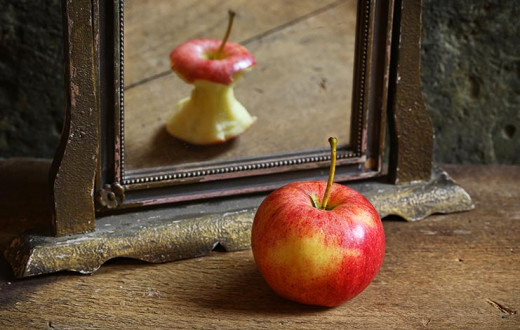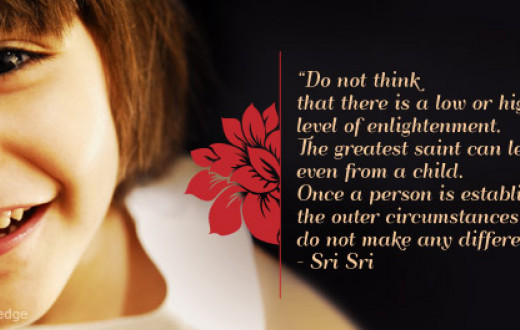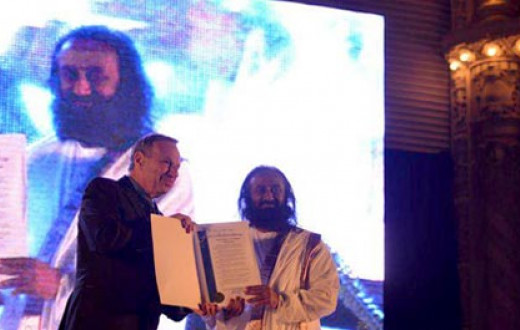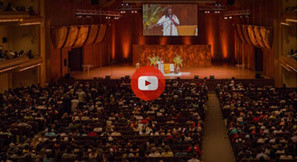9 Dec 2011
Video
Dear Guruji, I want to know why do we have to get moksha?
Sri Sri Ravi Shankar:
It is a natural tendency of every human being to be free. Freedom is not luxury, it is a necessity. Not just human beings even animals want freedom.
Babies want freedom. If you tie a scarf on the neck of a baby it just wants to remove it. You put a chain on a baby’s neck and the baby wants to pull it out.
It is the adults who put jewelry around their neck but children want freedom, they don’t want any restriction. That is why they throw their hands up and down; free!
Wanting freedom is innate to human beings as well as animals. Every life wants freedom and moksha is nothing but freedom. You take a deep breath in and you can’t hold it there, you want to breathe out. Only when you breathe out there is freedom. When you breathe out you want to take a breath in and that is freedom. Freedom is a natural desire in every human being but when the mind get so muddled up in unnecessary day to day things, it forgets that it wants freedom. It is as good as someone who wants to sleep but has forgotten how to sleep.
So every life or human being craves for freedom. It is impossible to not want freedom.
Freedom is not running away from situations and circumstance. Sometimes the situation is stifling or unpleasant and we run away from it and think this is freedom, but that is not so. Freedom means being unfazed by circumstances, situations and the people around you; freedom from your own emotional garbage; freedom from the jungle of your thoughts that bother you; freedom from all the entanglement that you harbor in your head and freedom from fear and anxiety.
Anything that stifles you makes you small and you want to be free from that and that is moksha.
Freedom (mukti) comes first and then bhakti. Only when you are free does love well up in you and bhakti comes.
If you think you are bonded labor you cannot be grateful.
If someone has brought you freedom you feel grateful, ‘oh I am so free. I feel happy!’
Only one who is happy and one who is centered can have gratitude or be in the space of love.
Now, is love not binding? This is the next question.
Yes, it is but it is a different type of bondage.
Love binds but love binds with the infinity. The bondage of love is the last one and that gets eased with knowledge and with wisdom.
Our tendency is to get bound somewhere. The tendencies of emotions are to get attached somewhere. So from small things that attachment goes towards something bigger and then it dissolves.
In the Vendanta they give an example of Alum.
To clean water you put a piece of alum. The alum cleans the water and then dissolves itself.
So that is why God is also called Mohana. The Divine takes your attention from little attractions to himself.
The passion of stillness and of meditation is so attractive that it relieves you from all other small things. If you are attached to liquor then meditation has to be much more charming than liquor, otherwise you can’t get over liquor.
If drugs are giving you joy then inner peace must give you greater joy than drugs. That is how people are able to get out of drugs and get into the spiritual practices (sadhana).
So the Divine is considered the most attractive.
Do you know the meaning of the word Krishna?
One who attracts everybody and everything towards him is Krishna. Krishna means most attractive. Irresistible attraction that one cannot resist at all, that much attraction!
The whole Bhagavatam is about how Krishna was so attractive and mesmerizing.
When he would go in the chariot and when he would pass by, people would just stand like statues staring at him. Even after his chariot would go away people would just keep their eyes open and keep staring. Someone would come and ask, ‘what are you staring at?’
The gopi says, ‘no doubt he went but he also took my sight with him. My attention also has gone with him.’
That is the seer, the scenery and the scene; everything becoming one.
There are many stories in the Srimad Bhagavatam.
One gopi was doing her makeup and she did her makeup on one eye and then she heard he is coming and she just left everything and ran out to the street to have a glimpse of him.
There are so many stories to indicate that the Divine is extremely attractive. This is so that the little attractions that the mind hankers onto are freed and that is why he is called Mohana.
Mohana means one who appeals to the heart, enchanting and endearing.
So the bondage of love with knowledge is different than the bondage that hankers for pleasure.
Hankering for pleasure creates a certain type of bondage which results in a lot of pain.
But the taste of love hooks you on to the infinity, to the Divinity and intoxicates you. That with the knowledge brings stability in life.
Life without emotion is so dry; emotion is needed. The emotion is either for the temporal or ephemeral or for the permanent; the permanent joy and the permanent bliss.
Babies want freedom. If you tie a scarf on the neck of a baby it just wants to remove it. You put a chain on a baby’s neck and the baby wants to pull it out.
It is the adults who put jewelry around their neck but children want freedom, they don’t want any restriction. That is why they throw their hands up and down; free!
Wanting freedom is innate to human beings as well as animals. Every life wants freedom and moksha is nothing but freedom. You take a deep breath in and you can’t hold it there, you want to breathe out. Only when you breathe out there is freedom. When you breathe out you want to take a breath in and that is freedom. Freedom is a natural desire in every human being but when the mind get so muddled up in unnecessary day to day things, it forgets that it wants freedom. It is as good as someone who wants to sleep but has forgotten how to sleep.
So every life or human being craves for freedom. It is impossible to not want freedom.
Freedom is not running away from situations and circumstance. Sometimes the situation is stifling or unpleasant and we run away from it and think this is freedom, but that is not so. Freedom means being unfazed by circumstances, situations and the people around you; freedom from your own emotional garbage; freedom from the jungle of your thoughts that bother you; freedom from all the entanglement that you harbor in your head and freedom from fear and anxiety.
Anything that stifles you makes you small and you want to be free from that and that is moksha.
Freedom (mukti) comes first and then bhakti. Only when you are free does love well up in you and bhakti comes.
If you think you are bonded labor you cannot be grateful.
If someone has brought you freedom you feel grateful, ‘oh I am so free. I feel happy!’
Only one who is happy and one who is centered can have gratitude or be in the space of love.
Now, is love not binding? This is the next question.
Yes, it is but it is a different type of bondage.
Love binds but love binds with the infinity. The bondage of love is the last one and that gets eased with knowledge and with wisdom.
Our tendency is to get bound somewhere. The tendencies of emotions are to get attached somewhere. So from small things that attachment goes towards something bigger and then it dissolves.
In the Vendanta they give an example of Alum.
To clean water you put a piece of alum. The alum cleans the water and then dissolves itself.
So that is why God is also called Mohana. The Divine takes your attention from little attractions to himself.
The passion of stillness and of meditation is so attractive that it relieves you from all other small things. If you are attached to liquor then meditation has to be much more charming than liquor, otherwise you can’t get over liquor.
If drugs are giving you joy then inner peace must give you greater joy than drugs. That is how people are able to get out of drugs and get into the spiritual practices (sadhana).
So the Divine is considered the most attractive.
Do you know the meaning of the word Krishna?
One who attracts everybody and everything towards him is Krishna. Krishna means most attractive. Irresistible attraction that one cannot resist at all, that much attraction!
The whole Bhagavatam is about how Krishna was so attractive and mesmerizing.
When he would go in the chariot and when he would pass by, people would just stand like statues staring at him. Even after his chariot would go away people would just keep their eyes open and keep staring. Someone would come and ask, ‘what are you staring at?’
The gopi says, ‘no doubt he went but he also took my sight with him. My attention also has gone with him.’
That is the seer, the scenery and the scene; everything becoming one.
There are many stories in the Srimad Bhagavatam.
One gopi was doing her makeup and she did her makeup on one eye and then she heard he is coming and she just left everything and ran out to the street to have a glimpse of him.
There are so many stories to indicate that the Divine is extremely attractive. This is so that the little attractions that the mind hankers onto are freed and that is why he is called Mohana.
Mohana means one who appeals to the heart, enchanting and endearing.
So the bondage of love with knowledge is different than the bondage that hankers for pleasure.
Hankering for pleasure creates a certain type of bondage which results in a lot of pain.
But the taste of love hooks you on to the infinity, to the Divinity and intoxicates you. That with the knowledge brings stability in life.
Life without emotion is so dry; emotion is needed. The emotion is either for the temporal or ephemeral or for the permanent; the permanent joy and the permanent bliss.
Gurudev, is developing wisdom a constant effort on our part or just pure grace?
Sri Sri Ravi Shankar:
Wisdom is natural.
We can’t do anything about it. You simply need to recognize it when it comes up and not brush it aside. That is all you need to do. That is why there is something called ‘Pratyabhijna Hridayam’, which means the heart of recognition.
We can’t do anything about it. You simply need to recognize it when it comes up and not brush it aside. That is all you need to do. That is why there is something called ‘Pratyabhijna Hridayam’, which means the heart of recognition.
Gurudev, when things change from ‘I want to do it’ to ‘I will have to do it’, it becomes very difficult to act. What to do in such situations?
Sri Sri Ravi Shankar:
If you have a commitment then you better do it.
Otherwise you will not be able to do anything because the mind is your most unreliable friend.
The mind says something now and a little later it says something else. You can rely on your friend better than on your own mind. You make a commitment and if you say, ‘I have to complete this and I must’, then life moves in the right direction. If you just act by the whims and fancies of your mind it will take you nowhere.
You want to become a doctor and you enrolled into a medical college but after two years if you don’t want to do it then say, ‘I have to do it.’
Better you do it and complete it. Otherwise one year medical, another year engineering, another year law and another year you will do chemistry and you will get nowhere. You will neither be an engineer, nor a doctor or a lawyer because you did it all for just one year because your mind wanted to. Commitment is essential in life.
When you come for an Advance Course the first day you like it but the second day you say, ’Oh my God! This is so boring, this hollow and empty thing. Who wants to know what is hollow and what is not hollow. Why should I torture myself with all this meditation in motion?’
You feel like going out a bit and having some fun. No! If you have made a commitment, complete it.
Now if it becomes really impossible for you to keep your commitment, then you can get out of it after giving your 100%.
If you feel that the commitment is not leading you anywhere and you make the commitment from a state of ignorance and now it is becoming hell every day, then I’d say, okay! You have given your 100% and it is not working, you can move on.
You can get rid of your commitment and make a new commitment.
Otherwise you will not be able to do anything because the mind is your most unreliable friend.
The mind says something now and a little later it says something else. You can rely on your friend better than on your own mind. You make a commitment and if you say, ‘I have to complete this and I must’, then life moves in the right direction. If you just act by the whims and fancies of your mind it will take you nowhere.
You want to become a doctor and you enrolled into a medical college but after two years if you don’t want to do it then say, ‘I have to do it.’
Better you do it and complete it. Otherwise one year medical, another year engineering, another year law and another year you will do chemistry and you will get nowhere. You will neither be an engineer, nor a doctor or a lawyer because you did it all for just one year because your mind wanted to. Commitment is essential in life.
When you come for an Advance Course the first day you like it but the second day you say, ’Oh my God! This is so boring, this hollow and empty thing. Who wants to know what is hollow and what is not hollow. Why should I torture myself with all this meditation in motion?’
You feel like going out a bit and having some fun. No! If you have made a commitment, complete it.
Now if it becomes really impossible for you to keep your commitment, then you can get out of it after giving your 100%.
If you feel that the commitment is not leading you anywhere and you make the commitment from a state of ignorance and now it is becoming hell every day, then I’d say, okay! You have given your 100% and it is not working, you can move on.
You can get rid of your commitment and make a new commitment.
Gurudev, you say opposite values are complimentary. Then how can we be happy during good times when we know that bad times will follow?
Sri Sri Ravi Shankar:
There is a beautiful couplet in Hindi:
‘Dukh main sumiran sab karey sukh main karey na koey;
sukh main jo sumiran karey dukh kahe ko hoye.'
Everyone prays when they are miserable. When there is nowhere to go and when all the doors are shut, in misery everyone prays. But in happiness if someone prays, why would misery befall on them?
‘Heyam Dukham Anagatam.’ In Yoga Sutra, Maharishi Patanjali says that the purpose of yoga is to stop misery from befalling on you. Yoga is not just the asanas but meditation as well.
So when you are happy and grateful then do seva. And when you are miserable, surrender and let go.
But what happens is when you are upset it is so difficult for you to let go and when you are happy you don’t want to do any service. That is why you become miserable.
It is very important for a miserable person to have the courage to surrender. Sometimes people are enjoying their misery and they do not let go of it.
So renounce in misery and serve in happiness. When you are happy, don’t get lost in the happiness and in the pleasure. Come out and do some service and that is prayer.
‘Dukh main sumiran sab karey sukh main karey na koey;
sukh main jo sumiran karey dukh kahe ko hoye.'
Everyone prays when they are miserable. When there is nowhere to go and when all the doors are shut, in misery everyone prays. But in happiness if someone prays, why would misery befall on them?
‘Heyam Dukham Anagatam.’ In Yoga Sutra, Maharishi Patanjali says that the purpose of yoga is to stop misery from befalling on you. Yoga is not just the asanas but meditation as well.
So when you are happy and grateful then do seva. And when you are miserable, surrender and let go.
But what happens is when you are upset it is so difficult for you to let go and when you are happy you don’t want to do any service. That is why you become miserable.
It is very important for a miserable person to have the courage to surrender. Sometimes people are enjoying their misery and they do not let go of it.
So renounce in misery and serve in happiness. When you are happy, don’t get lost in the happiness and in the pleasure. Come out and do some service and that is prayer.
Gurudev, I have been doing my kriya regularly for almost a year. What percentage of my past karmas have I repaid?
Sri Sri Ravi Shankar:
I will answer this if you tell me how many hairs you have on your head.
As long as there is hair and you have a comb, the job is done!
What is the point of counting the hairs or counting the teeth on the comb?
Karma is unfathomable. Nobody knows how much karma is there and everyday new karmas are being made.
Then there is individual karma, there is a family karma, there is collective karma.
Nowadays what doctors say is a family history, in ancient medical language they used to call it family karma.
So there are different types of karmas and we get rid of these karmas every day when we do sadhana. Bad karmas go and good karmas increase.
When you are doing good karmas, a portion of that good karma also goes to people around you. Your family, friends and everybody get a share of it.
It is absolutely fascinating to go into the realm of karma because it is so unfathomable. There is no end to the depth of it. It is almost like trying to measure the depth of the ocean which is so vast.
But when you have to sail through the ocean you don’t need to know the depth of the ocean. What is the point in measuring the depth? You are anyway going in the boat.
Knowledge and devotion are like the boat in which you sail through the ocean of the karma. You don’t need to know how deep it is. Anyway you are not going to swim or walk through the water.
As long as there is hair and you have a comb, the job is done!
What is the point of counting the hairs or counting the teeth on the comb?
Karma is unfathomable. Nobody knows how much karma is there and everyday new karmas are being made.
Then there is individual karma, there is a family karma, there is collective karma.
Nowadays what doctors say is a family history, in ancient medical language they used to call it family karma.
So there are different types of karmas and we get rid of these karmas every day when we do sadhana. Bad karmas go and good karmas increase.
When you are doing good karmas, a portion of that good karma also goes to people around you. Your family, friends and everybody get a share of it.
It is absolutely fascinating to go into the realm of karma because it is so unfathomable. There is no end to the depth of it. It is almost like trying to measure the depth of the ocean which is so vast.
But when you have to sail through the ocean you don’t need to know the depth of the ocean. What is the point in measuring the depth? You are anyway going in the boat.
Knowledge and devotion are like the boat in which you sail through the ocean of the karma. You don’t need to know how deep it is. Anyway you are not going to swim or walk through the water.
Gurudev, why are there seven days a week and twelve months in a year throughout the globe in all communities?
Sri Sri Ravi Shankar:
It had started in the Vedic time in India.
The ‘zero’, the ‘seven days’ and the ‘twelve months’ were first given here in India.
Then Egypt copied it from India and from there it went all over the world.
In India there are seven major planets. Though we have nine planets, two of them are shadow planets of the moon that don’t exist.
So for each planet one day was given. For the shadow planets they allotted one and half hours of time every day instead of allotting them one whole day, so it fitted very well with the cosmic calendar. That is how we have Rahu Kaal and Gulik Kaal.
They formed the connection between the microcosm and the macrocosm. And they said the Earth completes one circle around the Sun in twelve months and then they divided it.
This was done some thirty to forty thousand years ago or may be even more. Nobody knows.
The ‘zero’, the ‘seven days’ and the ‘twelve months’ were first given here in India.
Then Egypt copied it from India and from there it went all over the world.
In India there are seven major planets. Though we have nine planets, two of them are shadow planets of the moon that don’t exist.
So for each planet one day was given. For the shadow planets they allotted one and half hours of time every day instead of allotting them one whole day, so it fitted very well with the cosmic calendar. That is how we have Rahu Kaal and Gulik Kaal.
They formed the connection between the microcosm and the macrocosm. And they said the Earth completes one circle around the Sun in twelve months and then they divided it.
This was done some thirty to forty thousand years ago or may be even more. Nobody knows.
Gurudev, Ramji's guru was Vashishtha and Krishna's guru was Sandipani, who is your Guru?
Sri Sri Ravi Shankar:
Sandipani and all the Gurus are still there in the omnipresent guru-tattva. Adi Shankaracharya is among the lineage of Gurus.
In my childhood and youth I had the satsang of many great saints. Maharishi Mahesh Yogi was there, Shankaracharya, and some very learned and renowned saints; Swami Sharan Aanandji.
My childhood was spent with all elderly people.
Gurudev, when we do Sandhya Vandan in the evening, the sun is in the west. Then why do we do jaap (chanting) facing north?
Sri Sri Ravi Shankar:
After sunset the greatest power is of the magnetic poles, the north and south pole. For as long as the sun is there, the power is in the direction of the sun, but after sun set the energy of the north and south pole is dominant. That is why when doing Sandhya Vandan in the morning, homage is paid to the sun in the East, but in the evening by the time we finish with our offerings to the sun, the sun sets and so chanting is done facing north.
The ancient people thought about everything in a very scientific manner.
Do not attach too much importance to this.
What if you are in a place like Norway where the sun does not set for two months then which direction should you face?
'Daivam sarvato mukha', God is everywhere, so you can sit anywhere, in any direction for your prayers and meditation.
These scientific explanations are good primarily for tropical countries. If the sages had taken into account the arctic regions, they might have recommended that prayers and meditation to be done facing South.
Similarly, Vastu Shastra which is suitable for India may not be appropriate for Russia.
We need to make some corrections in these recommendations based on the region of the earth where it is being applied.
In India it is recommended that the main entrance to the house should not face south, because in those days the city was planned in such a way that cremation grounds were to the south of the city and breeze blowing from that direction would enter the house through the doors and windows facing south. So Vastu was formulated accordingly.
But if you go to Russia and the Scandinavian countries, there the sun is more intense in the south, and pleasant breeze blows from the south, so it is okay to have the main entrance facing south. If you keep the door which is facing south open, you will get plenty of sun all year round.
Therefore, applying Vastu Shastra blindly without making corrections is not right. Many people do not know this. They don't go into the depths of this knowledge. They are 'lakeer ke fakeer' - they follow without questioning what is written.
Do not attach too much importance to this.
What if you are in a place like Norway where the sun does not set for two months then which direction should you face?
'Daivam sarvato mukha', God is everywhere, so you can sit anywhere, in any direction for your prayers and meditation.
These scientific explanations are good primarily for tropical countries. If the sages had taken into account the arctic regions, they might have recommended that prayers and meditation to be done facing South.
Similarly, Vastu Shastra which is suitable for India may not be appropriate for Russia.
We need to make some corrections in these recommendations based on the region of the earth where it is being applied.
In India it is recommended that the main entrance to the house should not face south, because in those days the city was planned in such a way that cremation grounds were to the south of the city and breeze blowing from that direction would enter the house through the doors and windows facing south. So Vastu was formulated accordingly.
But if you go to Russia and the Scandinavian countries, there the sun is more intense in the south, and pleasant breeze blows from the south, so it is okay to have the main entrance facing south. If you keep the door which is facing south open, you will get plenty of sun all year round.
Therefore, applying Vastu Shastra blindly without making corrections is not right. Many people do not know this. They don't go into the depths of this knowledge. They are 'lakeer ke fakeer' - they follow without questioning what is written.
Dear Guruji, all that I do is sadhana, seva and satsang. Everyday in the morning I promise myself that I will not run behind you but every time I break my promise and I find myself running behind you all the time. Is it okay Guruji if I can’t keep this one promise?
Sri Sri Ravi Shankar:
You may run behind me but know that you cannot catch me!














































